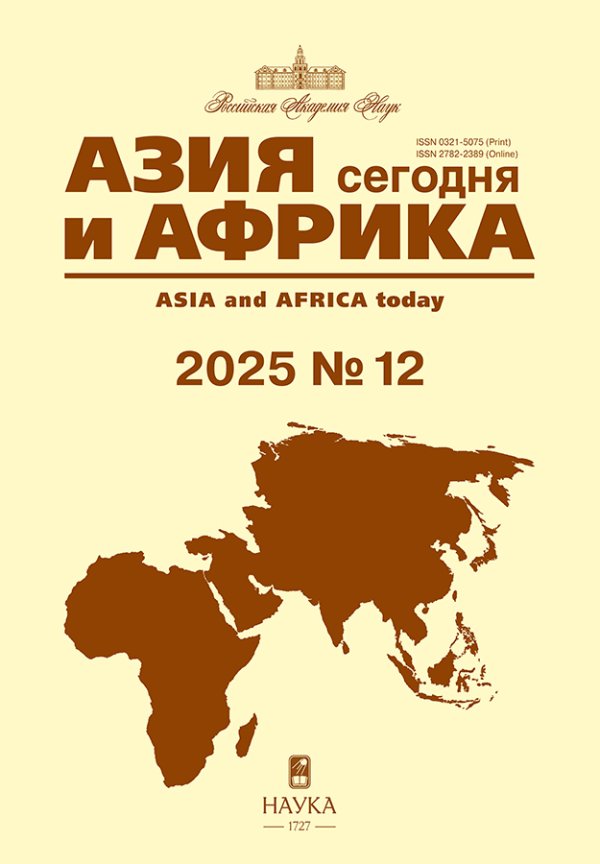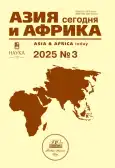No 3 (2025)
Politics, economics
Russia and China in the Eurasian Space: Contemporary Challenges and Risks of Transport Interaction
Abstract
Under the influence of increasing sanctions pressure from Western countries on the Russian Federation, the untapped potential of Russian-Chinese cooperation in the field of transport and transit can become a compensating resource that helps to partially smooth out the processes of complex economic adaptation of the domestic transport system. The importance of co-development of the Silk Road Economic Belt (SREB) and the Eurasian Economic Union (EAEU), taking into account the complex and long-term influence of Russian-Ukrainian events, is gaining new geopolitical weight. The article analyzes the specifics of national-regional and transport interests, mutual transport and logistics security problems, inconsistencies, competitive challenges and contradictions, features of national interests of transit countries, in particular the Central Asian states, which directly or indirectly determine the general level and nature of bilateral and multilateral relations with Russia and China.
Asia and Africa Today. 2025;(3):5-13
 5-13
5-13


Somalia: Another Round of Tension
Abstract
The article examines the recent instability in Somalia caused by conflicts amid territorial and economic disputes over Somali ports, as well as contradictions between federal and regional authorities. It shows that the agreement reached in early 2024 between Ethiopia and Somaliland led to a serious round of tensions that threatened to escalate into a regional conflict. The active actions of the federal government in Mogadishu, which did not recognize the treaty, escalated the situation to the point that a number of regional actors intervened in the conflict. As a result, the diplomatic efforts of Turkey, which has friendly relations with both sides, led to the conclusion of peace agreements between Mogadishu and Addis Ababa, which automatically reduced tensions. Another episode was the contradictions within the Somali federal states related to the presidential elections that were held in the state of Jubaland at the end of 2024. The federal government in Mogadishu did not recognize the election results and sent troops to restore order and prevent the conflict from escalating. It turned out that the conflict has deeper roots, which lie (among other points) in the political figure of the re-elected president of Jubaland, his ties with the Kenyan and Ethiopian authorities, the activities of radical Islamist groups, as well as clan and tribal contradictions.
Asia and Africa Today. 2025;(3):14-21
 14-21
14-21


International Competitiveness of China and the United States: Comparative Analysis
Abstract
The study provides comparative analysis of the competitiveness of two key global economic giants – China and the United States – in 2013 and 2023. The topic is of particular relevance against the background of geopolitical rivalry between the two countries. However, the political confrontation between China and the United States itself is beyond the scope of this paper. The study is based on the analysis of key macroeconomic indicators, the economies’ inclusion in international production systems, as well as the place of the countries in the leading global competitiveness rankings. The paper outlines the factors that determine the competitiveness of China and the United States and forecasts their influence on future competitive positions. Particular emphasis is placed on China. The results of the study show that by 2023 the US has ceded its position of leadership to China in several key macroeconomic indicators. Concurrently, the United States maintains a prominent status in various metrics related to science, education, and environmental sustainability, and also holds higher positions in almost all international rankings of global competitiveness considered.
Asia and Africa Today. 2025;(3):22-32
 22-32
22-32


France’s Policy towards the Central African Republic (2013–2024)
Abstract
The article examines France’s policy towards the Central African Republic (CAR) after the operation Sangaris (2013–2016). Due to the ineffectiveness of French military aid, the CAR began to develop relations with Russia since 2017. Thanks to Russian support, the training of soldiers of the national army has significantly accelerated, the peace agreement was concluded between the government and the rebels in 2019, and a coup d’état was prevented in 2020–2021. Initially France responded by increasing arms supplies and providing additional financial support for CAR’s budget. But when these efforts had not yielded the expected outcomes, France decided to exert significant pressure on the CAR’s leaders in order to force them to refocus on cooperation with Paris. CAR made concessions to France and agreed to work with the American private military company, Bancroft, despite existing agreements with the Russian Ministry of Defense and the Wagner Group. The research highlights that the new security agreements concluded by the Central African authorities pose a threat to Russian interests in the country.
Asia and Africa Today. 2025;(3):33-39
 33-39
33-39


Renewable Energy Sources: The Experience of African Countries
Abstract
For the countries of North Africa, as well as for the world as a whole, the problem of using renewable energy sources (RES) to stabilize economy and reduce climate threats is becoming relevant. The purpose of the article is to analyze the experience of North African countries in the field of RES from the perspective of progress in the socioeconomic and climatic spheres. The article substantiates the relationship between the use of “green” energy resources and the production of appropriate energy, macroeconomic indicators, and the climatic situation in Africa. A number of factors reinforce the need for the development of RES in Africa, including the tasks for stabilizing the economy, population growth, urbanization, climate change and – from 2022 – attempts to diversify energy sources by Western European countries. In North Africa, which has its own hydrocarbon resources, the situation in the energy sector is more favorable than in the world and sub-Saharan Africa. In the last decade, the production of total renewable energy in Africa, according to the IEA, has increased, while GDP production, according to UNCTAD, has decreased. The climate situation has not improved either. The authors conclude that the agenda for the development of RES in Africa should be comprehensively linked to other components of development, such as the circulation economy, the economy of shared consumption, digitalization and training.
Asia and Africa Today. 2025;(3):40-47
 40-47
40-47


Modern Problems of Xinjiang in the Context of the Implementation of Major Economic Projects in China
Abstract
The article examines the development of the Xinjiang Uygur Autonomous Region (XUAR) in the context of China’s implementation of a number of large economic projects aimed both at the development of individual regions and the country as a whole. In the 2000s, China began to implement such projects as “Development of Western China” and “One Belt, One Road”, which were designed to solve the problems of lagging the western (inland) regions of the country, meet its energy needs and promote the development of foreign trade. The importance of XUAR for China at the beginning of the XXI century increases due to its economic and geostrategic characteristics. Xinjiang is turning into a geo-economic outpost of China in the Central Asian region. At the same time, a number of problems could not be resolved. In modern Xinjiang, high indicators of macroeconomic development are adjacent to a complex of socioeconomic problems.
Asia and Africa Today. 2025;(3):48-57
 48-57
48-57


Vishwa Hindu Parishad and the Ram Temple in Ayodhya Fundraising Campaign
Abstract
The article examines a campaign conducted by the religious organization Vishwa Hindu Parishad (VHP, “World Hindu’s council”) with the help of the Sri Ram Janmabhoomi Tirth Kshetra Foundation (“Pilgrimage Square of Lord Rama’s Birthplace”), established by the Government of India, to collect funds for the restoration of the Rama Temple in the city of Ayodhya, Uttar Pradesh, on the site of the Babur Mosque, which was destroyed in December 1992. The restoration of the temple is one of the main points of the Hindutva ideology, which has been dominant in India since 2014 after the Bharatiya Janata Party (BJP) came to power and Narendra Modi was appointed as Prime Minister of India. The largest contribution to the restoration of the temple was made by the religious organization Vishwa Hindu Parishad, which organized religious processions in support of this initiative and then took control of collecting funds for the construction. The article shows how money was collected for the temple, how it was spent and what results were achieved during the campaign and after it.
Asia and Africa Today. 2025;(3):58-64
 58-64
58-64


BRICS today
Conjugation and Connectivity of Multi-Level Regionalization Projects: The Example of BRICS – SACU
Abstract
The expansion of BRICS with the inclusion of four new members in the organization – Iran, Egypt, Ethiopia, the UAE and, potentially, Saudi Arabia – marked the emergence of a new expanded BRICS+ format that actualized the study of regionalization processes in those regions that until recently were relatively weakly involved in global, macro-regional and regional processes of change associated with digital transformation, the formation of new industries, markets and institutions of cooperation. Using the coefficient of trade and economic connectivity and the trade index of propensity to export, the article presents an overview of the key trends, sectoral structure and dynamics of foreign direct investment in the SACU countries. It is shown that the inclusion of new members in BRICS can intensify trade between SACU countries and third countries, where the development of connectivity contributes to the expansion of markets and an increase in interregional trade, including those countries that previously did not trade with BRICS+ countries or did so only on a small scale.
Asia and Africa Today. 2025;(3):65-74
 65-74
65-74


Scientific life
Foreigners in Japan: Problems and Trends
Abstract
In September 2024, a round table “Foreigners in Contemporary Japan: Political, Economic, Social and Cultural Aspects” was held at the Institute of Oriental Studies of the Russian Academy of Sciences (RAS). It was organized by the Institute’s Center for Japanese Studies. The event attracted many listeners in person and online. It became a platform for discussions and debates for speakers from 7 organizations (Institute of Oriental Studies, Moscow State University, Institute of China and Contemporary Asia (RAS), Russian State University for the Humanities, MGIMO University, Institute for Comprehensive Analysis of Regional Problems, Far Eastern Branch of the Russian Academy of Sciences, Aoyama Gakuin, Japan). The participants discussed the problems of Japan’s migration policy, shifts in the structure of migrants, difficulties faced by foreigners, opportunities and prospects for the integration of foreign workers in the country, and considered the features and current problems of foreign diasporas in Japan.
Asia and Africa Today. 2025;(3):75-78
 75-78
75-78













